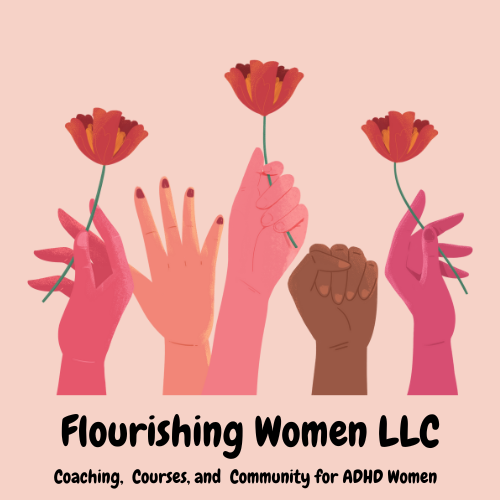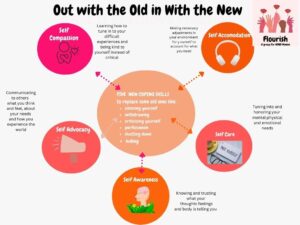The Flourish Empowerment Model: Fostering Growth for Neurodivergent Women
Embracing New Coping Skills with the Flourish Model
The Flourish Empowerment Model is a transformative framework designed to support the growth and well-being of neurodivergent women. It acknowledges the unique experiences of living with neurodiversity and provides strategies to replace outdated coping mechanisms with more empowering skills. This model is sensitive to the history of trauma and champions a self-paced, safe approach to personal development.
Out with the Old Coping Skills
Historically, neurodivergent women have developed coping skills that, while once necessary and protective, may contribute to burnout, anxiety, depression, and unhappiness in the long term. These include:
- Silencing oneself to blend in
- Withdrawing to avoid confrontation
- Criticizing oneself excessively
- Adhering to perfectionism to meet external expectations
- Shutting down emotionally in stressful situations
- Hiding one’s true self to avoid judgment
In with the New: Empowering Coping Skills
The Flourish Model encourages the cultivation of new coping skills that promote self-compassion, advocacy, care, accommodation, and awareness. These skills are rooted in an understanding of one’s worth and the right to exist authentically:
- Self-Compassion: Learning to tune into your difficult experiences and being kind to yourself instead of critical.
- Self-Advocacy: Communicating to others what you think and feel, about your needs, and how you experience the world.
- Self-Care: Tuning into and honoring your mental, physical, and emotional needs.
- Self-Accommodation: Making necessary adjustments in your environment to account for what you need.
- Self-Awareness: Knowing and trusting what your thoughts, feelings, and body are telling you.
The Path to Flourishing
The journey with the Flourish Model is personal and unique to each individual. It’s about building resilience and embracing growth at a pace that feels safe and sustainable. By gradually replacing old coping mechanisms with these new skills, neurodivergent women can experience:
- Increased Self-Esteem: As they embrace self-compassion and self-care, they begin to value themselves more.
- Improved Relationships: With self-advocacy, women can communicate their needs more clearly, leading to healthier relationships.
- Greater Fulfillment: Self-awareness and self-accommodation enable women to create environments where they can thrive.
- Reduced Stress: By adopting these new coping skills, women can reduce the risk of burnout and emotional distress.
Conclusion
The Flourish Empowerment Model offers a path to a more empowered and fulfilling life for neurodivergent women. It’s a gentle reminder that growth and change are possible and that each step towards new coping skills is a step towards a happier, more authentic life.

